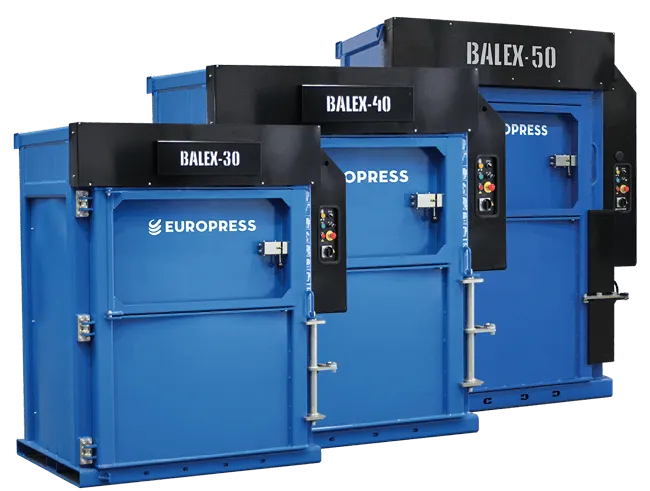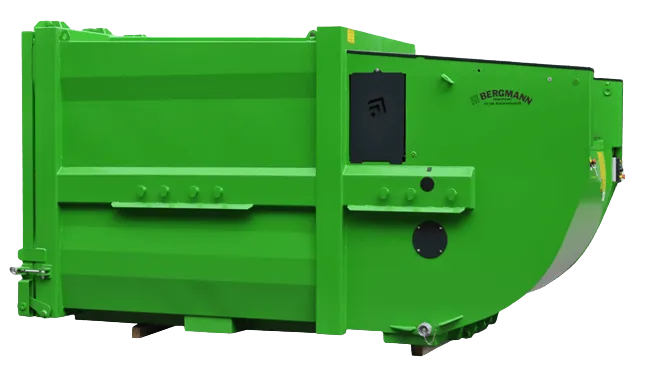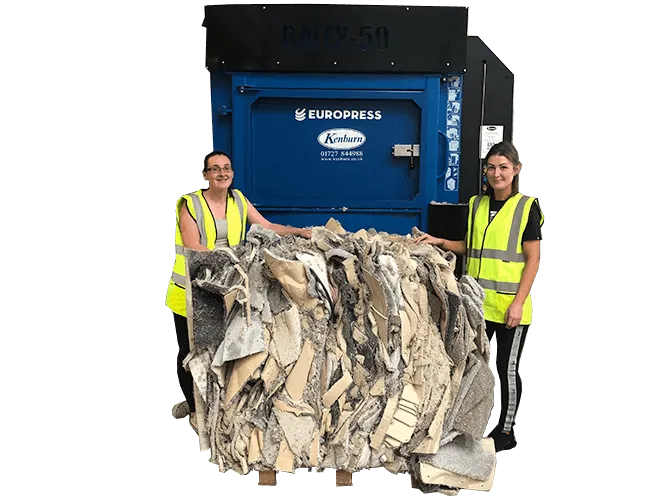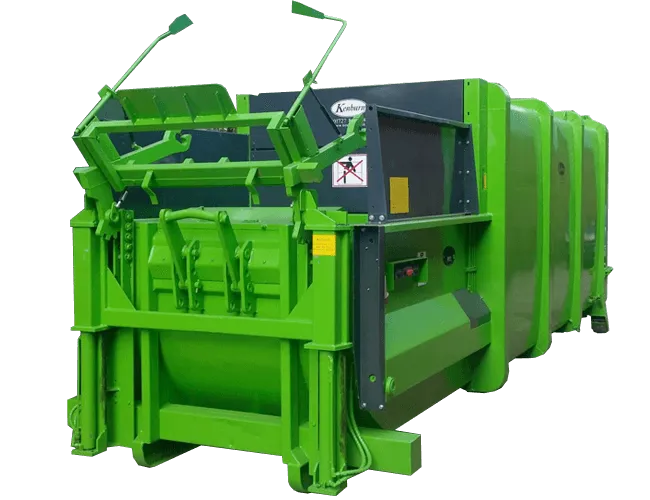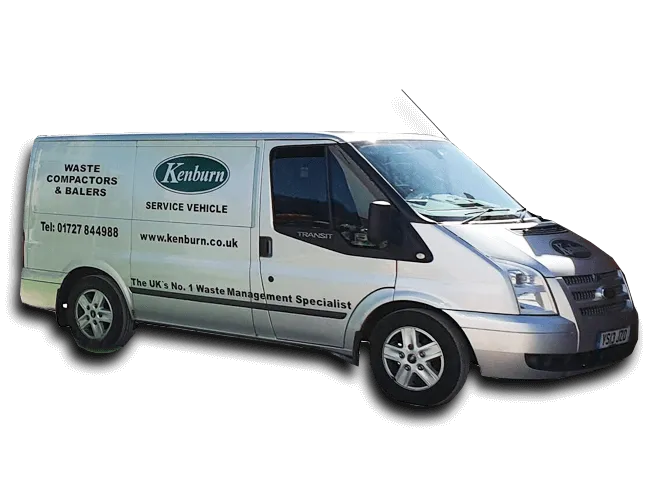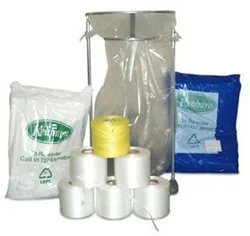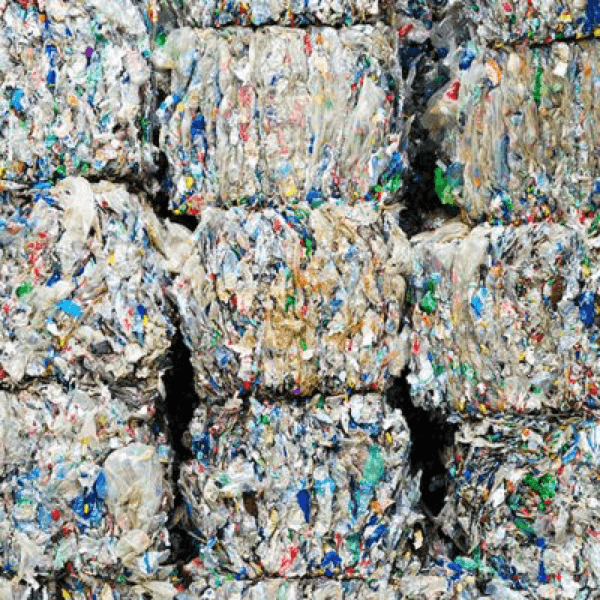
The best choice of baler depends on the volume of waste you produce, the composition of your waste and the size of items you need to compact into manageable bales. Finding the right baler depends on your requirements, and the best way to start your search is by auditing the composition/materials in your waste. In order to make sure you select the correct baler, Kenburn provide free, no-obligation waste surveys to establish the volumes of waste your business generated. From this, the best choice of baler can be ascertained.
As there is such a wide range of balers, there is sure to be one that meets your needs:
Cardboard & Paper Waste
Cardboard and paper equate to 41% of total waste generation in Europe. Much of this is packaging material, and businesses produce huge quantities of cardboard and paper waste. Fortunately, many balers can effectively compact cardboard and paper.
Balers are popular for managing cardboard and paper waste, as they can significantly reduce the cost of waste collecting, saving you space and time. When uncompacted, cardboard and paper can occupy large spaces, so transforming it into a compact solid block of material makes plenty of sense.
The vast majority of balers are equipped to effectively deal with cardboard and paper waste. Vertical balers of all sizes and many mini-balers will be capable of effectively dealing with reasonably high volumes of corrugated cardboard and paper waste. For example, suitable balers for this need may be new Europress Balex balers or refurbished Bramidan balers, which will suit most businesses waste management needs.
However, if you expect a continuous throughput of paper and cardboard waste, a horizontal baler may be better suited. The Avermann AVOS series comprises of cost-effective semi (or fully) automatic bale tying that can be adjusted to your specific requirements, although these are typically more costly than vertical balers.
Plastics
As there is a wide variety of plastic wastage produced by businesses, the best baler for the job will depend on the composition and density of the plastic. Additionally, the size and volume of material should guide your choice.
Soft Plastics (♻ 04 LDPE)
Items such as plastic bags, cartons and tubes are categorised as soft plastics. Soft plastics are also prime candidates for baler processing, as they can be relatively easily compacted. Some cardboard and paper balers are also suitable for soft plastics.
Plastic Bottles (♻ 01 PET)
As plastic bottles, cups and food containers are more irregularly shaped, some balers are unable to effectively process this type of waste. However, more powerful balers can effectively compact these items – more powerful machinery is necessary to hold these materials together.
However, you may need to add cardboard layers at the top and bottom of the finished bale to allow it to retain its structure. To identify the right type of Avermann AVOS baler for PET – download the AVOS Baler Type comparison.
Hard Plastics (♻ 02 HDPE)
If your business produces a large quantity of hard plastic waste, then a more specialised baler will be necessary, depending on the size of the waste that you produce. Smaller items, like plastic jugs, will need their lids removed to get the best results from compacting. Larger plastics, like plastic drums, will require heavier duty balers, such as a Europress Balex Baler.
Expanded Plastics (♻ 06 PSE)
Polystyrene (EPS) and Styrofoam poses a unique challenge when selecting a baler, as the materials are effectively 98% air – bulky, but very light. If your business produces a lot of this waste, then expanded plastics provide the biggest cost-saving benefits when baled.
Vertical balers are the most effective type for dealing with expanded plastics. Bergmann Roto Compactors allow expanded plastics to be compacted into bags or wheelie bins to minimise any mess that can be created when these are processed.
Metals
Metal waste is also fairly common, with food cans and aluminium cans forming large volumes of waste in public places and restaurants. However, due to their small form and strength, not all balers are capable of effectively compacting these sorts of items.
Balers appropriate for metal waste require a high compaction force, with linearly arranged cylinders, to provide sufficiently deep pressure and create a solid block of material. This makes waste balers such as the Avermann AVOS 147 the most appropriate for dealing with large quantities of metal waste.
Not all metal waste comes in a small form factor, however. Storage containers such as steel drums can take up large areas in storage, although they are light to move around. However, these require specialist steel drum presses – some can also compress waste inside the drum.
Selecting the right baler
Choosing the right baler will enable you to save money, time and space, but knowing which one to select can be difficult. Ultimately, the material of waste that your business produces in large quantities will be one of the main factors, but there are other considerations to make, too.
The size of baler you need will be determined by your needs. If you have a high throughput of waste, then a horizontal baler can be programmed to operate semi-automatically or fully automatically. However, if you have a smaller throughput, vertical balers may be a more cost-effective solution.
Undertaking a full site waste audit is one sure-fire way to get a clear understanding of your needs from a baler. Kenburn offer free site audits by expert waste management professionals to review your needs and find the most cost-effective solution for your business.

